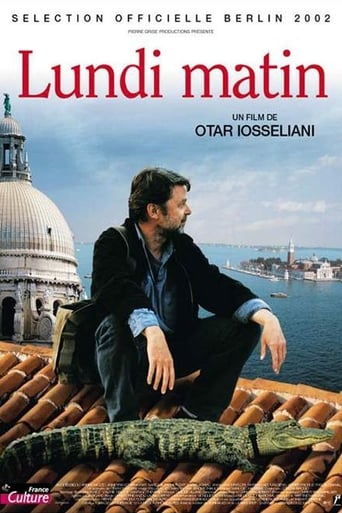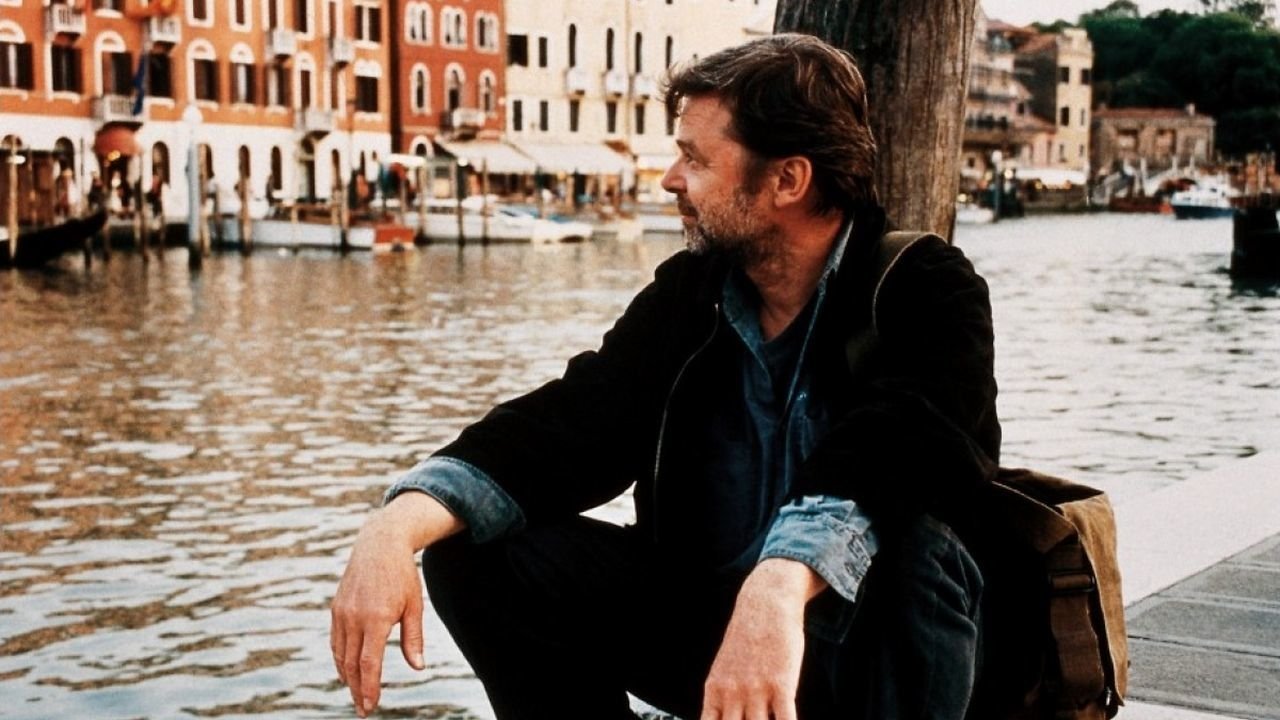groggo
Once you can get past the idea that 74-year-old writer-director Otar Iosseliani does not make traditional linear films but exaggerated send-ups of everyday life, you might enjoy his wondrous romps. Iosseliani is a brilliantly funny, understated satirist and deadpan absurdist.Jacques Tati is one of Iosseliani's influences (as he freely admits), and many quirky Tatiesque touches are in full view in this and other Iosseliani films. His frames are not so much concerned with plot as with people who seem to be frenetically busy while they're actually not doing much of anything at all. This is Iosseliani's view of the world: life as ennui and illusory importance, life filled with people who are not really sure what they're doing on Planet Earth. Vincent (French actor Jacques Bideau) works in a disgusting chemical plant that belches monstrous clouds of pollutants, yet absolutely no smoking is allowed on the premises. Vincent is a hapless but well-meaning, aspiring painter who's regularly ignored by his rotten kids (they're always telling him to get lost).Vincent's father (Radslav Kinski) tells him to take a vacation and 'luxuriate' in the great breeding grounds of Western culture, to find the historical roots of our great modern societies. So Vincent goes to Venice, where he and other tourists circle canals in boats, going nowhere and seeing nothing. He climbs a roof with a Venetian, who shows Vincent an array of ancient, grimy factory buildings -- the antithesis of the usually romantic Venetian facade -- and proudly says: 'This is Venice'. Vincent sends postcards of the Pyramids to his mother, who rips them up, not the slightest bit interested. He meets his uncle (Iosseliani himself), who's actually a flamboyant charlatan, a layabout lout pretending to be some kind of 'noble' who records piano music and pretends it is he who is playing.Vincent returns from his odyssey, having achieved and experienced very little of anything. No other director in the world is quite like Iosseliani. There are a lot of Brecht's 'distancing' techniques in this Georgian-born director's work. There is relatively little dialogue, and he rarely, if ever, shows close ups -- the screen is always full of characters in long shots who are always trying to do something, or go somewhere, even if it's across the street and back again. The absurdity of human purpose is a recurring motif in Iosseliani's work. Another important aspect of the director's films is his divergence from the usual centre of cinematic action (i.e. the foreground). This technique was perfected by Jean Renoir in his brilliant 'Rules of the Game'(1939) and partially repeated two years later in 'Citizen Kane'. Since then, the technique has been used to great effect by, especially, Robert Altman. Ioselliani revives it brilliantly here. Many of the great moments in his films -- see for example 1999's Adieu, Plancher des Vaches (Farewell, Home Sweet Home) -- are taking place in the background. This is a reflection of Iosseliani's world view: what happens behind us is often more important than what happens in front of us. Iosseliani's humour is always understated. There are no slapstick moments in his films -- just flourishes of quirky, off-centre people doing a lot of silly things. We all live lives of quiet ennui, even as we believe we don't. Life is ultimately a process of movement from one tedious experience to the next. Nobody shows this better, or does this better, than Otar Iosseliani.
writers_reign
I can't help feeling that some of the people who've commented on this are asking this director to be something he's not - he is, by the way, Georgian, not French, although his last few films were made in France. He does tend to meander and more or less hit upon an idea and let it lead him where it will which may be hard to take for those - myself included - who are more at home with a well-made script that boasts a beginning, a middle and an end. But he also has charm, a commodity in short supply these days and practically non-existent in Hollywood. In some ways our protagonist is directly related to Preston Sturges' Sullivan except that Sullivan was an affluent movie director who went slumming and OUR hero is a working stiff with a dream. In both cases they wound up back at home like Dorothy and Toto but no one can take the JOURNEY away from them and that's what it's all about.
dhvinyl
This just popped up on BBC 4, a digital station in the UK and the review tempted me. Had no really idea what it was all about but was fascinated throughout. The French know how to let a movie take its course without heavy editing and cutting. Very little dialogue yet you sink straight into the rut and routine of life in a tiny French village; and then the contrast of the romance of Venice. The characters are well defined, and I loved the way the family children looked after the grandparents, while the husband - the central character - seemed to live just for his cigarettes. The realisation that working life is much the same anywhere sent him home where he's received as if he'd never been gone! Anyone who's seen "Etre & Avoir" will feel right at home with this.
WriConsult
The cinematography is very nice, with vivid shots of Venice and the french countryside, and the characters have the potential to be quite interesting. But the characters are about 80% developed to the point where we'd really care about them, and the whole thing doesn't tie together very well. Plus the pace is maddeningly slow. Message to the director: We get the point! It's hard for me to hate this film, but I can't rave about it either.


 AD
AD
